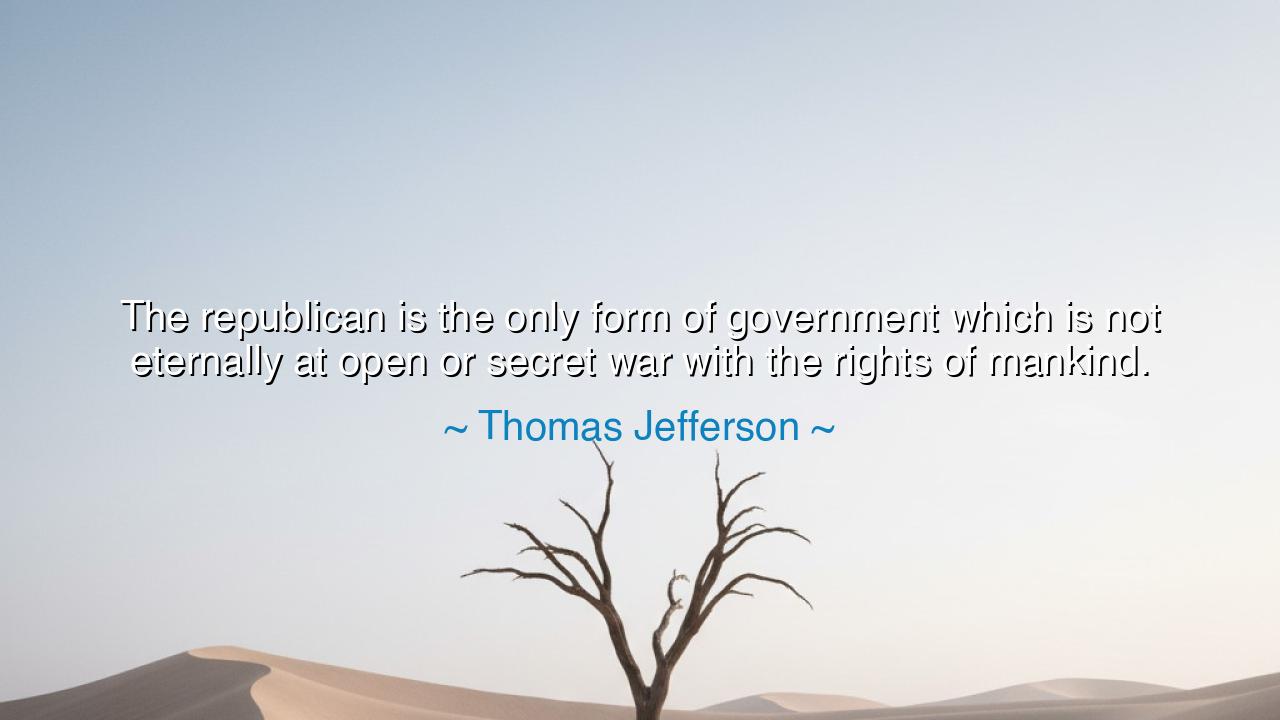
The republican is the only form of government which is not
The republican is the only form of government which is not eternally at open or secret war with the rights of mankind.






"The republican is the only form of government which is not eternally at open or secret war with the rights of mankind." – Thomas Jefferson
In this solemn declaration, Thomas Jefferson, one of the principal architects of liberty, speaks to the very heart of what it means to be governed in freedom. His words proclaim that only a republican form of government—one founded upon representation, law, and the consent of the governed—can live in peace with the rights of mankind. All other systems, whether monarchies, empires, or dictatorships, wage either open or secret war against human liberty. Some crush it with the sword of tyranny; others, more insidiously, smother it under the guise of benevolence. Jefferson saw that true freedom is not granted from above but sustained from below—by the people themselves, vigilant and united in the defense of their natural rights.
The origin of this quote lies in the aftermath of revolution and the birth of a new order. Jefferson had witnessed the decay of monarchies and the arrogance of hereditary power. He saw how kings clothed oppression in ceremony, how empires justified conquest in the name of “civilization,” and how the common man was forever the subject of someone else’s will. Having studied the lessons of history—from the fall of Rome to the despotism of Louis XIV—Jefferson concluded that only a republic, where the government draws its strength from the virtue and reason of its citizens, could coexist with the eternal dignity of man. To him, all other systems were but gilded chains, for power concentrated in the few inevitably seeks to devour the rights of the many.
Consider the example of ancient Rome, whose story mirrors Jefferson’s insight. In her earliest days, as a republic, Rome was a city of shared purpose and civic duty. Her citizens served their state not as slaves, but as partners in destiny. Yet when power shifted into the hands of emperors, the same Rome that once defended liberty turned to conquest and cruelty. The people became subjects, their voices drowned by imperial decree. The transition from republic to empire marked the beginning of Rome’s war against its own spirit—the loss of freedom to the intoxication of dominion. So it is in every age: when the structure of government ceases to be accountable to the people, the rights of mankind are the first casualties.
Jefferson’s words also carry the weight of his own time—the American experiment, fragile and newborn, standing as a challenge to the crowned heads of Europe. He believed that if the United States failed, it would not be because the people were unfit for freedom, but because they forgot that freedom requires discipline, virtue, and constant defense. He feared that even a republic could decay if its citizens surrendered their vigilance or allowed ambition and corruption to creep into its halls. For though a republic may be the only system compatible with liberty, it does not guarantee liberty by its mere name—it must be nourished by justice, honesty, and civic courage.
The deeper meaning of Jefferson’s statement lies not merely in political structure but in moral philosophy. Governments, like men, are tempted by the lust for control. A monarchy’s pride may wear a crown, but tyranny can also wear the mask of democracy. When rulers forget that they are servants of the people, when laws serve privilege instead of principle, then even the fairest system becomes an enemy of mankind. Jefferson’s warning, therefore, is timeless: the moment power ceases to answer to the people, it becomes a weapon against them.
History provides endless reminders of this truth. The French Revolution, which began in pursuit of liberty, equality, and fraternity, soon gave rise to terror and empire. What began as a republic turned, in a few short years, into Napoleon’s dominion—a government once born for freedom now enslaving nations. This is the tragedy Jefferson foresaw: that every government, no matter how noble its birth, must be ever guarded lest it revert to its natural tendency—to rule, rather than to serve.
The lesson for us is both clear and grave: freedom cannot survive without participation, vigilance, and virtue. The republic is not a gift—it is a trust, one that must be renewed by each generation. Let the people not look to their leaders as masters, but as instruments of their will. Let them question power, resist complacency, and remember that the truest patriot is not the one who shouts the loudest, but the one who defends justice the most faithfully.
Thus, Jefferson’s wisdom endures like a torch passed through time: that only in a republic, where the law is born of conscience and sustained by character, can mankind live without perpetual war against itself. For when men govern themselves in righteousness, there is no need for kings; and when the spirit of liberty reigns in their hearts, no tyrant can ever truly reign over them.






AAdministratorAdministrator
Welcome, honored guests. Please leave a comment, we will respond soon